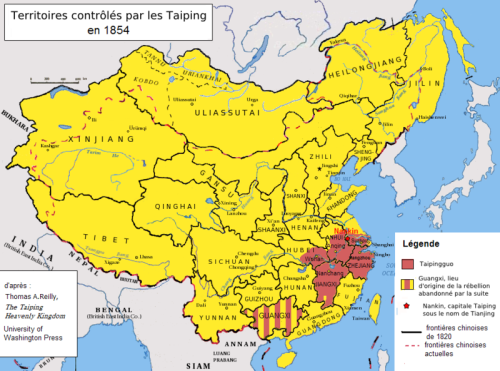The Taiping Rebellion Part III — The Taiping Heavenly KingdomIn case you missed Part I and Par
The Taiping Rebellion Part III — The Taiping Heavenly KingdomIn case you missed Part I and Part IIAfter the Taiping rebels captured Nanking in 1853, its messianic leader Hong Xiquan, supposed brother of Jesus, declared the founding of the Taiping Heavenly Kingdom. The Taiping Heavenly kingdom was not a large domain, only covering over the provinces of Jiangxi, Hebei, Anhui, and Zhejiang. However, the kingdom had a large population as it dominated some the largest cities and population centers in China. Equally important almost everyone who had a bone to pick with the Manchu Emperor flocked to the kingdom for citizenship. In ancient times the Chinese Empire could have easily crushed such a small rebellious kingdom with it’s mighty Imperial Army. However in 19th century China the Imperial system was in a slow and stagnant decline. Moreover Hong Xiquan’s rebellion was not the only rebellion taking place in China. All over the country smaller rebellion sprouted. The Imperial Army was stretched very thin trying quell these rebellions while at the same time defending the frontier from nomadic tribes and unsuccessfully fending off European colonial powers such as Britain and France. The Chinese Empire could do little to end the rebellion, for the most part all it could do was contain and mitigate the problem. It was under these conditions that the Taiping Heavenly Kingdom was allowed to grow and thrive.Hong Xiquan was named king of the kingdom, but in 1853 he withdrew from public life, issuing decrees by letter and spending the rest of his time pursuing religious studies. The kingdom developed a very complex bureaucracy, with a functioning government and system of provinces headed by regional “kings” and “princes”. Unlike the old China, where government was guided by Confucianism, the government of the Heavenly Kingdom based it’s policies and laws on the Bible. Thus, the Heavenly Kingdom was theocratic government with no distinction of church and state. The Heavenly Kingdom was also very radical in its policies. The Kingdom sought to completely revolutionize society, remolding it on the teachings of the Bible and Hong Xiquan. All forms of religion except Christianity were banned. The Taiping Kingdom was a classless society. Slavery was banned. Private property was abolished and all land and wealth was distributed equally by the state. Its no wonder that the 20th century Communist leader Mao Tse-Tung often looked toward the Heavenly Kingdom as inspirations for his Communist regime. When it came to the sexes, the Heavenly Kingdom was extremely progressive. Women could occupy high ranking government and religious positions. Even the army had a large number of women. On the reverse side of the coin, sexes were segregated throughout the entire kingdom. The army had separate units for men and women. Incredibly society itself was divided in such a way, with all men and women living and sleeping in separate communal houses. An exception for married couples was made in 1855. Finally activities that were vices were banned, including smoking, drinking, gambling, and prostitution. The penalty for participating in such activities was death.The Taiping Heavenly Kingdom was most popular with the lower classes of Chinese society, mostly because they were the most oppressed. The Kingdom did try to lure more people from the Chinese middle class into the revolution as well. While much of the middle class was also disgruntled with the Manchu Emperor’s governance, the Taiping rebellion was too extreme, especially the communist nature of the rebellion, the separation of sexes, and the religious nature of the rebellion. As a result the Taiping Heavenly Kingdom saw little support from the Middle Class.By 1860 the Taiping Heavenly Kingdom had grown into a prosperous little country. The Kingdom had also raised a powerful army numbering around 500,000 soldiers. It was then that Hong Xiquan planned the final phases of his rebellion; an attack to the north to capture Shanghai followed by a final assault to capture Beijing and overthrow the Emperor.To be continued… -- source link
Tumblr Blog : peashooter85.tumblr.com
#history#taiping rebellion#chinese history#19th century#war#government#religion#theocracy#hong xiquan#communism


